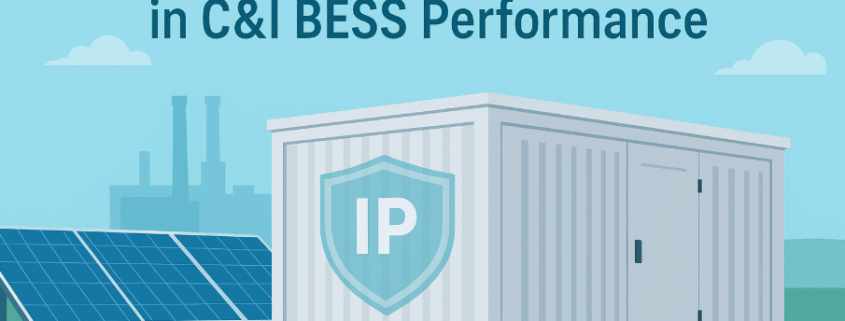The Role of IP-Rated Enclosures in C&I BESS Performance
Why Enclosures Matter in C&I BESS
In the world of commercial and industrial battery energy storage systems (C&I BESS), performance and reliability depend on more than just advanced batteries and control systems. One often overlooked component is the BESS enclosure. Enclosures act as the first line of defense against dust, moisture, temperature extremes, and physical damage. The use of IP-rated C&I BESS enclosures ensures not only long-term performance but also compliance with global safety standards.
At Sunlith Energy, we design enclosures that balance safety, efficiency, and scalability for diverse applications in renewable energy, EV charging hubs, and grid support.
What Are IP Ratings in C&I BESS Enclosures?
An IP ratinghttps://www.iec.ch/ip-ratings (Ingress Protection) defines how well an enclosure resists dust and water penetration. For C&I BESS enclosures, this rating is crucial because systems are often deployed in harsh industrial or outdoor environments.
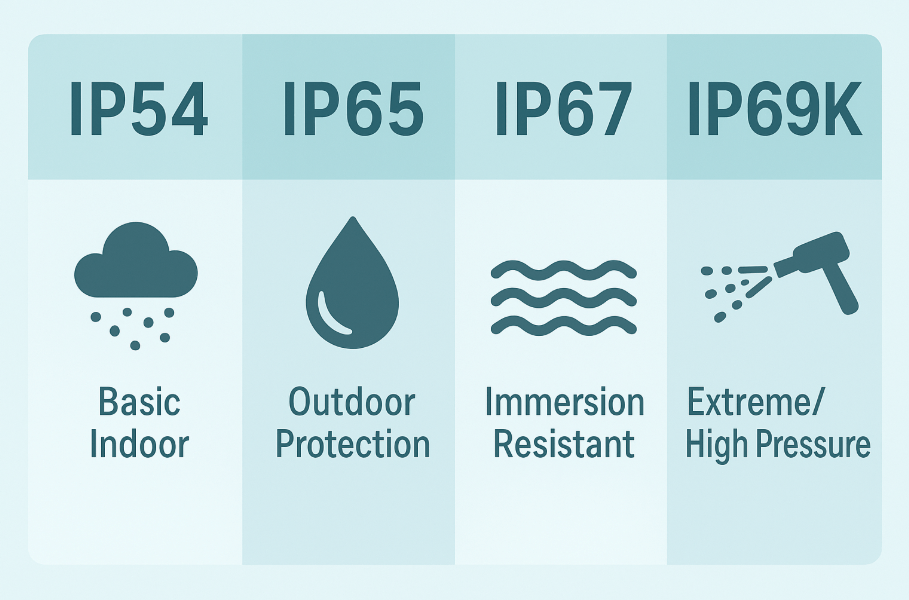
- IP54: Basic indoor protection against dust and splashing water.
- IP65: Outdoor-level dust-tight enclosure with water spray protection.
- IP67: Resistant to immersion, suitable for flood-prone areas.
- IP69K: Extreme protection against high-pressure water jets and severe environments.
➡️ Learn more about Key Components of C&I BESS (IP Enclosures Section).
Why C&I BESS Enclosures Need IP Protection
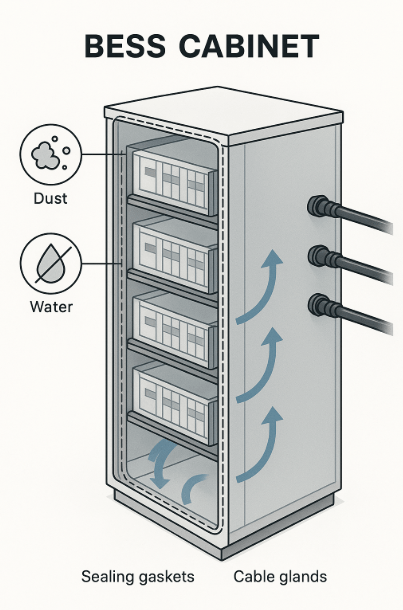
Unlike residential systems, C&I energy storage systems face more demanding operational conditions. Choosing the right C&I BESS enclosure enhances:
- Durability – Prevents dust buildup that can impair cooling systems and electronics.
- Safety – Reduces the risk of short circuits and fire hazards caused by moisture ingress.
- Performance – Maintains thermal stability and system efficiency under varying climates.
- Compliance – Supports certifications for safe operation in industrial and utility environments.
Indoor vs Outdoor Applications
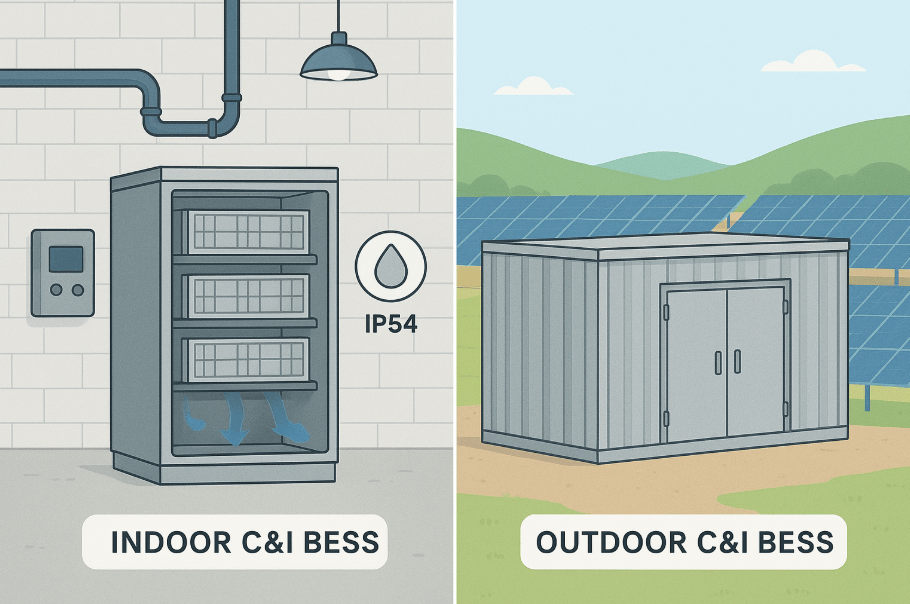
Different C&I projects demand different enclosure strategies:
- Indoor C&I BESS enclosures (IP54–IP65): Suitable for factories, warehouses, and commercial spaces. They provide moderate dust and moisture protection while maintaining cost efficiency.
- Outdoor C&I BESS enclosures (IP65–IP67): Essential for solar farms, EV fast-charging stations, and microgrids where systems face rain, dust storms, and high humidity.
This careful selection ensures maximum uptime and reduced maintenance costs.
C&I BESS Enclosures and Safety Standards
IP ratings directly contribute to safety and compliance by ensuring protection from hazards such as:
- Electrical shocks due to water intrusion
- Overheating caused by blocked airflow
- Contamination from dust and industrial particles
At Sunlith Energy, we integrate IP-rated enclosures as part of a broader compliance strategy that aligns with UL, IEC, and fire safety standards.
➡️ Read more about our Safety & Compliance practices.
Choosing the Right IP-Rated C&I BESS Enclosure
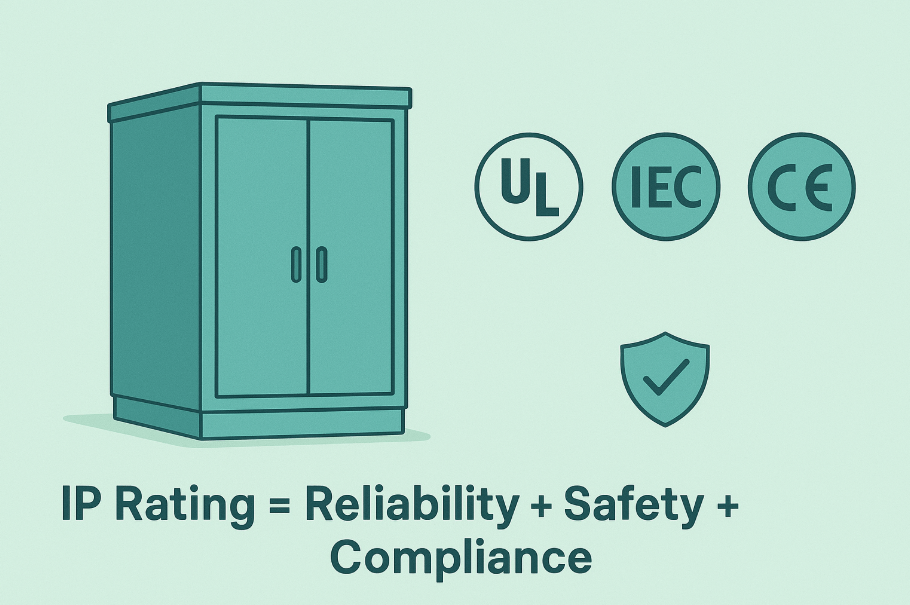
When selecting an enclosure for your C&I battery storage project, consider:
- Environment: Dusty factories, coastal areas, or flood-prone zones need higher IP ratings.
- Application: Indoor projects may optimize for cost with IP54, while outdoor utility-scale projects require IP65–IP67.
- Scalability: Larger systems benefit from modular enclosures with high IP protection to ensure reliability as capacity grows.
Conclusion: Enclosures Define Reliability
C&I BESS enclosures are not just boxes that house batteries; they are a critical safeguard that ensures performance, reliability, and compliance. By choosing the right IP-rated enclosure, businesses protect their investments, enhance safety, and enable long-term sustainability in energy storage projects.
At Sunlith Energy, we provide advanced C&I BESS solutions with enclosures tailored to industrial and commercial needs, ensuring that your system is built to last.
Frequently Asked Questions (FAQ) about C&I BESS Enclosures
1. What is an IP-rated C&I BESS enclosure?
An IP-rated C&I BESS enclosure is a protective housing designed for commercial and industrial battery energy storage systems. The IP rating specifies how well the enclosure resists dust and water, ensuring safety and durability in challenging environments.
2. Why are IP ratings important for C&I BESS?
IP ratings define how resistant enclosures are to dust and water intrusion. For C&I BESS enclosures, higher IP ratings mean better protection, which translates into improved system reliability, longer lifespan, and compliance with industry safety standards.
3. Which IP rating is best for C&I BESS enclosures?
The choice depends on the application:
IP69K: Used in extreme industrial conditions where systems face high-pressure cleaning or severe weather.
IP54–IP65: Best for indoor commercial or industrial settings.
IP65–IP67: Ideal for outdoor environments exposed to rain, dust, and humidity.
4. How do C&I BESS enclosures improve safety?
By preventing water, dust, and debris from entering the system, C&I BESS enclosures reduce the risk of electrical faults, overheating, and fire hazards. They also help ensure compliance with UL and IEC safety standards.
5. Do all commercial and industrial BESS require high-IP enclosures?
Not always. Indoor C&I BESS may only need moderate protection (e.g., IP54), while outdoor and utility-scale BESS demand higher protection (e.g., IP67). The correct choice balances cost, environment, and safety needs.
6. How does Sunlith Energy ensure quality in its C&I BESS enclosures?
At Sunlith Energy, our enclosures are engineered with high-quality sealing, robust materials, and compliance with international standards. Each C&I BESS enclosure is tested for dust and water resistance to guarantee long-term reliability.


